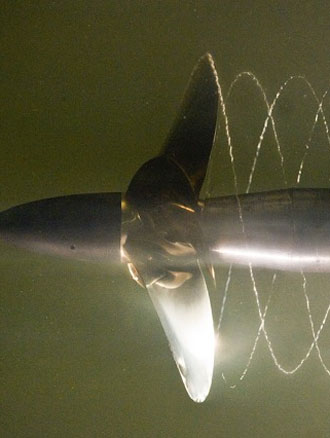June
The rising tide of marine engineering

Newcastle University has announced a £1.5m investment to further expand its world-leading School of Marine Science and Technology.
Building on the existing Blyth Marine Station which opened last year, the new development will house the University’s Emerson Cavitation Tunnel – an experimental facility used to test propellers and turbine blades.
Dating back to the 1950’s, the cavitation tunnel is the only one of its kind in the UK and is currently based in the old Boiler House on the main university campus.
The move to Blyth will not only allow an expansion of the facility but also the installation of other experimental facilities supporting research on propeller design and biofouling.
Due to be completed by the end of next year, the aim is to create a Centre of Excellence for Marine Hydrodynamics, Coatings and Materials, working with key academic and industry partners including International Paint.
Professor Andrew Willmott, Head of the School of Marine Science and Technology at Newcastle University, said:
“Newcastle has world-leading expertise in both propeller design and in the development and testing of coatings that reduce biofouling and this new Centre of Excellence will greatly enhance our capabilities in this increasingly important field.
“This new build at Port of Blyth will double the size of the existing facility, allowing us to strengthen our research capacity and also increase our opportunities for new collaborations and partnerships with marine sector industries, which are so important to the North East economy.”
The glory days of the North East ship building industry may be behind us, but the region’s role as a leader in marine engineering is far from over.
Together with industry leaders such as Bel Valves, SMD, Shepherd Offshore and Akzo Nobel, Newcastle University is helping to re-invigorate the sector to become a leader in new and emerging technologies.
Led by the School of Marine Science and Technology, research in this field pulls together the engineering expertise from across the University’s Faculty of Science and Engineering and a number of new developments are underway that will see a growth in marine engineering research.
The first of these is the £7m Neptune National Centre for Subsea and Offshore Engineering, announced by former Business Secretary Vince Cable as a key part of the Government's Oil and Gas Strategy.
Being developed on the north bank of the River Tyne, the Centre will be the first of its kind in the UK, bringing together industry and academia to create a world-class engineering research facility.
A related project is the Neptune Hyperbaric Test Centre, a £10m collaborative project with BEL Valves. This new venture will feature one of the best equipped deep-sea testing facilities, capable of testing subsea equipment to an equivalent of 4500m water depth.
Blyth Marine Station is home to the University’s Research Vessel - the R/V Princess Royal - as well as teaching rooms, workshops, and an aquarium.
To showcase some of these new developments, the University will be part of a major two-day Subsea North East conference being held next week at St James’ Park.
Alongside key industry collaborators, the event is an opportunity to explore new opportunities for future exploration and sustainable development of the marine industry.
Professor Nick Wright, Pro-Vice-Chancellor for Research and Innovation at Newcastle University said:
“Here in the North East there is both the commitment and the expertise to drive forward innovation in this rapidly-developing sector.
“Projects such as Neptune help put our academic community and industry at the centre of subsea and offshore engineering research, driving up skills and developing the innovations needed to fuel growth in the marine industry.
“We already have close links with a number of companies and next month’s event gives us the opportunity to expand this network and strengthen existing collaborations.”
published on: 3 June 2015
